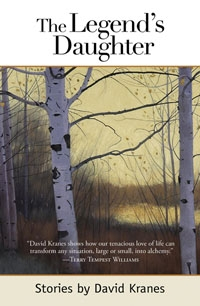The Legend's Daughter
Stories
Short story collection filled with dynamic prose and genuine characters amid rugged Idaho landscape.
In the opening story in this robust collection of ten, “Where I Am … Where I’ve Been,” two buddies on the last night of their weeklong fishing trip agree, as Clifford explains to Woods, “To find the women … who are in us … who are outside of us.” There’s no more tender a moment throughout The Legend’s Daughter than this, though Kranes is plenty generous throughout, his characters every bit embraceable and real and genuine as they are fallible—in short, human.
The landscape is real, too—Idaho, and rugged, as are the lives some of these folks lead. By the closing lines of “The Legend’s Daughter,” there’s a sense of smoke-and-mirrors or, perhaps, mostly smoke, as one-time musician and grieving stepfather Tom Bachman helps Lanie Lou Macklin search for her father, the musical legend Mackie Macklin. Like so many of Kranes’ characters—lost or abandoned, broken and broken-hearted—Lanie says, “It’s terrible, you know? You want something, then, when you get close, what you’ve wanted scares the shit out of you. You think, I don’t want this after all. It’s too big. It’s too true.”
Kranes’ prose is big, too—achingly big, these words from the title story practically leaping from the page, poetry in motion: “And, in the liquid night, spinning light, the shape played—voice a wanderer, out from the shadows to the blackened rafters of the shabby tavern, notes like lust, words like light, voice like ashes.”
Kranes allows his characters keen reflections: The young boy in “The Man Who Might Have Been My Father” considers his life were his mother to marry the man they’ve set off to meet. In “Angel of Death,” a grown son, estranged from his father, is conflicted between revenge and reconciliation. “Between Projects” introduces us to a famous actor paddling a kayak; a former nun and ex-firefighter; a semi-reclusive artist; and the ex-nun’s ex-con father. “Between Projects” doesn’t involve mirrors, but lots of smoke, and fire.
There’s something to be said about a writer whose style is easily recognized, whose voice stands out, whose stories are readily identified. What’s remarkable about David Kranes’s writing and these stories, though, is that each story stands out on its own merit, while every story is well crafted and conceived. Nothing one-dimensional about his people, nothing one dimensional about his prose, either.
Reviewed by
Chris Henning
Disclosure: This article is not an endorsement, but a review. The publisher of this book provided free copies of the book to have their book reviewed by a professional reviewer. No fee was paid by the publisher for this review. Foreword Reviews only recommends books that we love. Foreword Magazine, Inc. is disclosing this in accordance with the Federal Trade Commission’s 16 CFR, Part 255.

